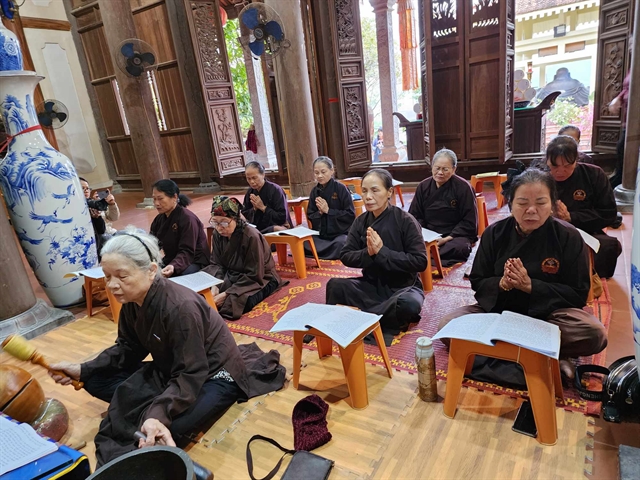 Society
Society

 |
| People recite the Buddhist scriptures in a temple in Hòa Bình Province. — VNS Photo Lê Việt Dũng |
HÀ NỘI — Việt Nam's government puts religious freedom high on its agenda and has taken measures to ensure unhindered practice of faith for all religions in the country.
The remark was made by Nguyễn Tiến Trọng, Deputy Director of the Government Committee for Religious Affairs, at Thursday's press conference on human rights.
He said Việt Nam has officially recognised two more religious organisations, Hiếu Nghĩa Tà Lơn Buddhism and Vietnam Full Gospel Church, and approved the establishment of the Vietnamese Baptist Theological Seminary last year.
As of late 2023, 38 religious organisations have been recognised and thousands of religious congregations have been registered, including 60 congregations for foreigners residing in Việt Nam.
"Việt Nam has recently granted the operation registration certificate to the Vietnam United Gospel Outreach Church and is in the process of reviewing other religious organisations for recognition," said Trọng.
He also said the National Assembly had passed the revised Law on Land, allocating land lots free of land-use fees for building places of worship and headquarters of religious organisations.
IUU fishing
Vũ Duyên Hải, Head of the Department of Capture Fisheries, Directorate of Fisheries, said Việt Nam had embarked on a significant course of action to fight illegal, unreported and unregulated (IUU) fishing.
On the legal front, the country recently enacted Decree 37 on implementing the Law on Fisheries and Decree 38 on financial penalties against fishery violations, tightening the reins on fishing activities.
It has also ceased the construction of new fishing vessels and not approved any request for conversion from vessels engaged in environmentally detrimental activities.
By 2030, the total number of fishing vessels across the country is projected to decrease to 83,600, down 3.7 per cent compared to 2023.
For vessels measuring 5 meters or more, strict rules apply upon returning from fishing expeditions. These vessels must dock at designated ports and undergo supervision of their catch quantities.
"The Ministry of Agriculture and Rural Development has taken stringent action against ports found violating regulations related to issuing certificates of origin for seafood products," said Hải.
He also said approximately 28,600 vessels had been equipped with voyage monitoring systems (VMS), and a list of vessels at high risk of IUU had been compiled and regularly updated.
The compilation acts as a watch list for relevant agencies, allowing them to closely monitor, inspect and take necessary action against any violation.
He added that Việt Nam had rolled out the electronic Catch Documentation and Traceability (eCDT) system to track the loading and unloading of seafood through ports, maintaining detailed logs that serve as the foundation for origin certification. — VNS




